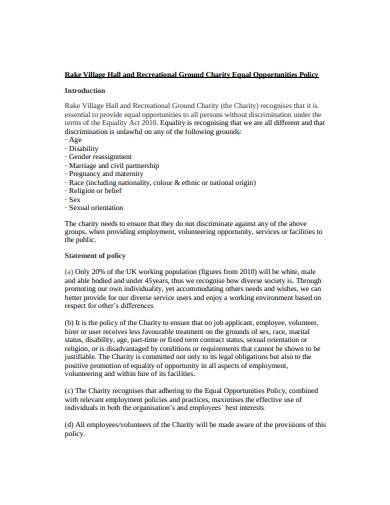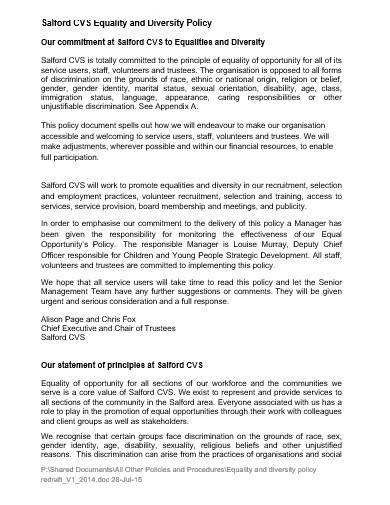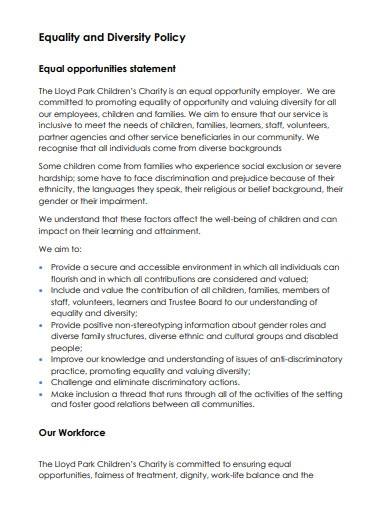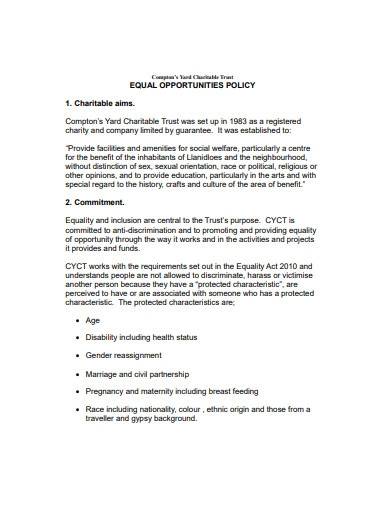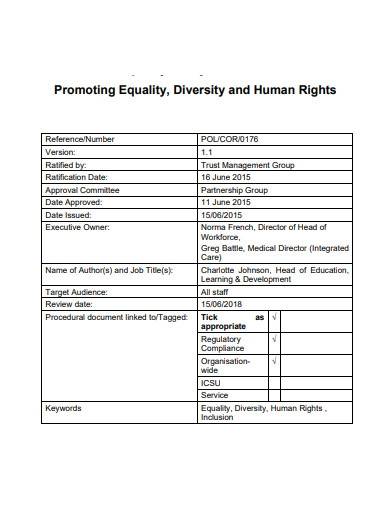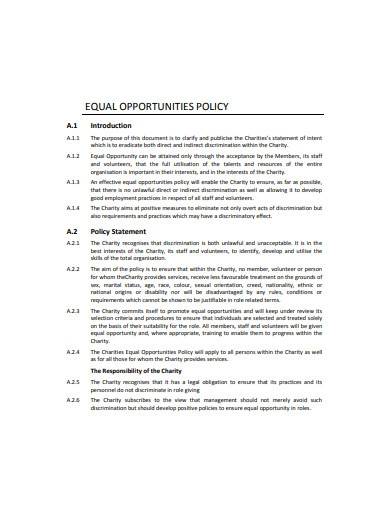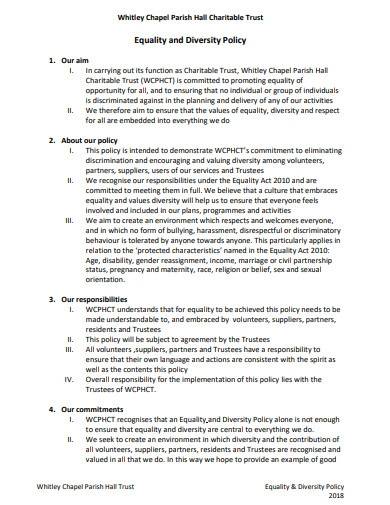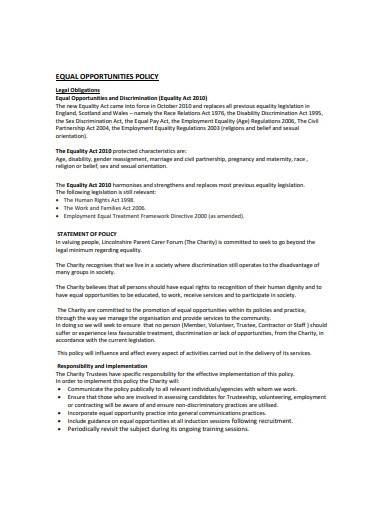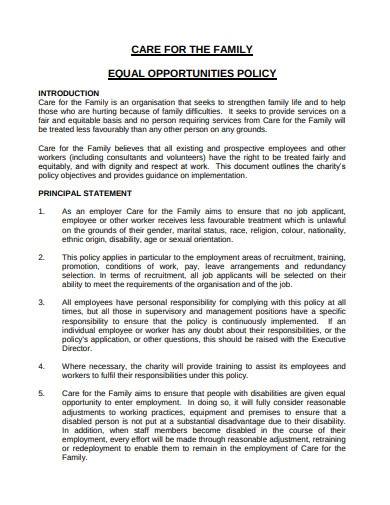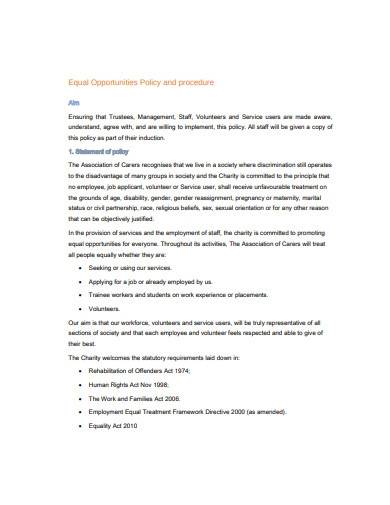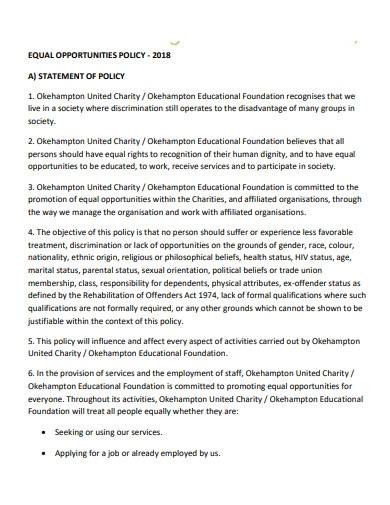Working in charitable organizations involves collaboration with various types of people. Therefore, it is one of your roles and responsibilities to implement a company policy that represents equality and diversity while promoting it regularly in your daily life. A charity equality and diversity policy is an agreement to avoid discrimination and create a safe place for both team members and customers. Charities also implement equal opportunities policies which is a formal document that expresses their commitment to treating all of their employees fairly. Other policies that charities implement include charity volunteer management policies, charity safeguarding policies, charity remuneration policies, charity reserves policies, charity pay policies, and more.
FREE 10+ Charity Equal Opportunities Policy Samples & Templates in MS Word | PDF
1. Charity Equal Opportunities Policy Template
2. Charity Equality and University Policy Template
3. Equal Opportunities Statement Policy Template
4. Charity Equal Opportunities Policy
5. Charity Promoting Equality Template
6. Sample Equal Opportunities Policy
7. Equality & Diversity Policy Format
8. Simple Equal Opportunities Policy Template
9. Trustee Equal Opportunities Policy
10. Charity Equal Opportunities Policy & Procedure
11. Basic Charity Equal Opportunities Policy
What is a Charity Equal Opportunity Policy?
An equal opportunity policy for charitable organizations is a written policy that helps in ensuring that all of their staff, team members, or volunteers are treated fairly and in compliance with laws and regulations. This document contains the employer’s commitment to providing fair and equal treatment of their employees, fair working practices, as well as appropriate measures that the organization will take to prevent potential unfair treatment at work. This policy enforces fair treatment of employees regardless of their sex, age, race, gender reassignment, pregnancy, disability, beliefs, and marital status.
How to Create Charity Equal Opportunity Policy
Equal treatment within an organization relates to various areas of employment such as its recruitment process, terms and conditions, payment terms and benefits, training, promotion and transfer opportunities, and more. Charity equal opportunity policies can also relate to different kinds of unfair treatment such as direct and indirect discrimination, harassment, and more. Developing an equal opportunity policy involves the ability to provide a clear compliance policy statement that explains the proper measure to take when dealing with unfair employee treatment.
Step 1: Make Sure to Be Specific
You can start writing your policy by stating your strict compliance with the Equality Act to express your acknowledgment of its existence. Then, highlight the specific non-merit characteristics that you don’t discriminate against like the candidate’s medical history, gender, national origin, sexual orientation, race, and more.
Step 2: Put Emphasis on Your Commitment to Equality and Diversity
Express your organization’s openness to diversity in your policy to encourage applicants to apply for a position in your charity. It might be standard practice but it will efficiently emphasize your charity’s appreciation of diversity.
Step 3: Describe the Practices That Your Policy Covers
Include a sentence or two in your policy to clarify employee practices that your policy covers. This includes all areas of employment such as recruitment, training, promotion, and termination.
Step 4: Explain That Your Hiring Decisions are Based on Merit
Provide a statement that emphasizes your charity’s decision-making process in hiring candidates based on their merit and qualifications.
FAQs
What are the benefits of implementing equal opportunity policies?
With equal opportunity policies, companies are able to enhance their reputation and appreciation from the public, enable them to access a wider pool of applicants and talents, improve the productivity of their employees, and promote diversity in their workplace.
What are the different forms of unlawful discrimination?
Unlawful discrimination can happen in various forms such as direct discrimination, indirect discrimination, harassment, and victimization.
What are the key elements to consider when developing an equal opportunity policy?
When developing your charity’s equal opportunity policy, consider writing an introductory or opening statement, an explanation of the law, a list of various types of discrimination, the responsibility to enforce reasonable adjustments for disabled staff, disciplinary sanctions for discriminatory conduct, and the procedures for reporting discriminatory concerns.
Charities implement equal opportunity policies to show their commitment to preventing any form of discrimination within their organization, raise awareness, reduce potential conflict, enhance morale, and protect the charity from possible legal actions. Charity equal opportunities policies are formal documents that provide an outline of their strict compliance with fair treatment of all its team members regardless of their marriage and civil partnership, religion, sexual orientation, age, disability, and race.
Related Posts
-
FREE 8+ Charity Remuneration Policy Samples & Templates in PDF
-
FREE 10+ Charity Reserves Policy Samples & Templates in MS Word | PDF
-
FREE 10+ Charity Mission Statement Samples and Templates in MS Word | PDF
-
FREE 10+ Charity Pay Policy Samples & Templates in MS Word | PDF
-
FREE 5+ Charity Investment Policy Samples & Templates in MS Word | PDF
-
FREE 10+ Charity Privacy Policy Samples & Templates in MS Word | PDF
-
FREE 3+ Charity Investment Strategy Samples & Templates in PDF | MS Word
-
FREE 10+ Charity Risk Management Policy Samples & Templates in PDF
-
FREE 10+ Charity Standing Order Form Samples & Templates in MS Word | PDF | MS Excel
-
FREE 5+ Charity Marketing Policy Samples & Templates in PDF
-
FREE 5+ Charity Recruitment Policy Samples & Templates in MS Word | PDF
-
FREE 3+ Charity Management Accounts Samples & Templates in PDF
-
FREE 10+ Charity Equality and Diversity Policy Samples & Templates in MS Word | PDF
-
FREE 10+ Charity Financial Policy Samples & Templates in MS Word | PDF
-
FREE 10+ Charity Expenses Policy Samples & Templates in MS Word | PDF

